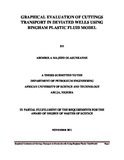| dc.description.abstract | The transportation of cuttings and efficient hole cleaning are indispensible in any drilling program. This is because a successful drilling operation is the key to a profitable business in the oil and gas sector. A successful drilling program is as a result of an efficiently cleaned hole.
Cuttings transport efficiency in vertical and deviated wellbores has been reported to depend on the following factors: hole geometry and inclination, average fluid velocity, fluid flow regime, drill pipe rotation, pipe eccentricity, fluid properties and rheology, cuttings size and shape, cuttings concentration, cuttings transport velocity, rate of penetration and multiphase flow effect.
In this work, the effects of mud flow rate, ROP, annular clearance, mud and cuttings densities on annular fluid velocity, transport ratio and mean mud density on cuttings transportation are investigated. Correlations based on the work of Larsen et al (1997) and Borgoyne et al. (1986)
are developed and used to generate nomographs. The data used by Larsen et al. (1997) and real well data in the work of Ranjbar (2010) were used to validate the equations used in this study.
The results obtained from the new equations closely conform to those of Larsen et al (1997) method and also predicted the required flow rate in the example well data of Ranjbar (2010). | en_US |

